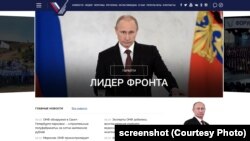A top official of the All-Russia People’s Front (ONF) – a political mobilization organization founded by Russian President Vladimir Putin – criticized the results of the annual Corruption Perceptions Index (CPI) report published by global corruption watchdog, Transparency International.
“The index does not reflect an objective picture as it is based solely on surveys among experts and entrepreneurs,” said Ivan Yastreb, the deputy chief of ONF.
Transparency International uses a score from zero for “highly corrupt” to 100 for “very clean” to compile the perceptions index of corruption worldwide.
In the 2016 index, Russia remained at the 2015 level with a scoring of 29 out of 100. Russia fell down 12 places in the index to rank 131st of 176 countries - tied with Ukraine, Kazakhstan, and Iran. The score keeps Russia rated as one of the world’s most corrupt nations.
Over the last decade or so, there has been criticism of Transparency International's CPI as to whether it is a fair and accurate metric to measure corruption by experts who study global good governance.
Yastreb references one of the most prominent criticisms—that the CPI rankings are based upon the subjective opinions of country experts and those who do business in the country, which some experts say may not reflect how a country’s broader society experiences or views corruption.
Yastreb suggests that “for receiving a more accurate picture, it would be necessary to also interview ordinary citizens.”
However, Transparency International says that its ratings are based upon strong, reliable data.
In an email to Polygraph.info, spokeswoman Marwa Fatafta said that the CPI "is computed using up to 13 different surveys that capture the perceptions of experts or business executives on issues surrounding public sector corruption.
"The CPI uses surveys from reputable organizations that have a transparent data collection process as well as several rounds of validations to ensure high level of data quality,” she said.
While others have criticized the CPI’s reliance on subjective perception metrics, Fatafta said the index "relies upon perceptions because many forms of corruption are hidden from the public eye and take place behind closed doors that are not easily captured by any objective measure.
"While objective measures of corruption exist, such as the number of corruption cases prosecuted, such measures are limited to specific types of corruption,” she said.
“They also are more an indicator of the efficacy of judicial system, for example, than a real corruption indicator. Hence, we believe perceptions based measures capture corruption levels effectively,” she said.
Dan Hough, a professor of politics at University of Sussex and author of an article critical of Transparency International's index, told Polygraph.info in an email that "the CPI makes no claim to be an objective measure of corruption."
"The clue is in the title - it's about perceptions," he said. "Whilst using perceptions as a guide has its problems, perceptions do still matter.
"People act on what they think reality is," Hough said. "So if someone perceives something to be true then they base their actions on that perception. Perceptions therefore matter rather more than critics perhaps care to acknowledge."
Moreover, surveys of “ordinary citizens” tell much the same story about corruption in Russia as Transparency's CPI ranking.
Polls of Russian citizens conducted by the Russian Public Opinion Research Center and the Levada Center show results and trends that generally concur with those of the Transparency findings.
They generally reflect a Russian society with broad and serious corruption that has improved modestly over time. A page from the organization which leads the Russian government’s anti-corruption efforts shows a series of infographics that demonstrate similar popular pessimism.
In an email to Polygraph.info, Stephen Blank, a Senior Fellow for Russia at the American Foreign Policy Council, said that “in Russia, corruption is the system. The government would collapse, along with the economy, without it."
The European Council’s anti-corruption authority, known as the Groups of States against Corruption (GRECO) said in a compliance report in November 2016 that Russia has “implemented or dealt with in a satisfactory manner with 11 of the 21 recommendations” the authority made in 2003 for Russia to rid itself of corrupt practices.
“The other ten recommendations have been partly implemented,” the report said, adding that there are other areas of concern.
GRECO said that latest reform of corruption-related provisions in Russia’s Penal Code represents “a significant step backwards compared to the previous draft legislation.” GRECO said the public sector bribery section of the code no longer conforms to European standards.
Thus, considering that public opinion polls, expert opinion, and Russian compliance with international guidelines good governance all seem to align with the conclusions represented by the CPI, Yastreb's complaint about Transparency International's index being 'not objective' is, at the very least, seriously debatable.





